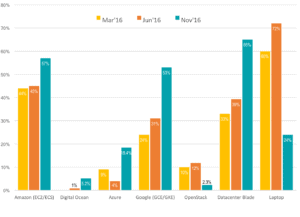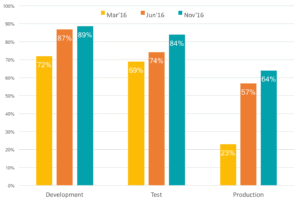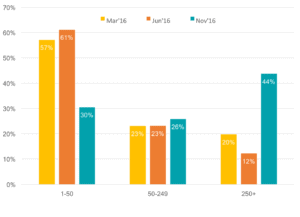In conjunction with CloudNativeCon+ KubeCon (Nov 8-9, 2016), the Cloud Native Computing Foundation (CNCF) conducted a survey of attendees. More than 170 conference attendees completed the survey, with a majority of respondents (73%) coming from technology companies (vs. enterprise IT), including suppliers of cloud management technology.
The goal of the study was to understand the state of deployment of Kubernetes and other container management platforms, as well the progress of container deployment in general.
While this was the first time CNCF had taken the temperature of the container management marketplace, comparisons to other surveys, such as Google’s own Kubernetes Survey in March, 2016 and again in June 2016 highlight important trends in this space. You can download the raw survey data here.
Cloud Management Platforms
Container Management Platforms Preferences
While both the recent CloudNativeCon + KubeCon survey and the Google surveys targeted audiences with an existing interest in Kubernetes, it’s interesting to observe changes in this segment of the container management marketplace over just the last eight months, including:
- Growth in commitment to Kubernetes from 48% (Google survey, March) to 83% (CloudNativeCon + KubeCon survey)
- Ongoing move away from home-grown management (Shell Scripts and CAPS) to commercial off-the-shelf (COTS) solutions (Kubernetes, Docker Swarm, Mesos, etc.)
Locus of deployment
The CloudNativeCon + KubeCon survey also illustrates other types of maturation in container management, in particular changes in the locus of deployment on premises and cloud platforms:

Container Deployment Platforms
Highlighted trends include:
- Incrementally growing hosting on Amazon and doubling of deployment on Google clouds in only 8 months
- Doubling of hosting on Microsoft Azure from March to November 2016
- A shift from ad hoc workstation container hosting to data center blades in premises-centric applications, representative of a maturing from purely experimental deployment to more serious development and even production settings (see next section).
Kubernetes supporting containers in production
Definitely, the most interesting observable trend from the CloudNativeCon + KubeCon survey is the maturation of Kubernetes deployment, with both growth in respondents investing in Kubernetes for development test, and a near tripling over the last eight months of Kubernetes in production settings:

The Shift from Development/Test to Production for Kubernetes
Container usage volume on the rise
Not only are more companies using containers in all stages of the product/services life-cycle, they are also using a larger fleet of containers overall, as low volume deployments (<50 units) rise by 27%, with higher volume deployments (>250 units) more than doubling. In fact, 12% of respondents in the CloudNativeCon + KubeCon survey report deploying more than 1,000 containers, with an additional 19% fielding more than 5,000.

Growth in Container Deployment Volumes
Upcoming events – Join us to learn more Kubernetes in production
Interested in learning more about how to use Kubernetes and other cloud native technologies in production? Join us at our upcoming events – Cloud Native/Kubernetes 101 Roadshow: Pacific Northwest 2017, February 7 – February 9 – or CloudNativeCon + KubeCon Europe 2017.
The three-city training tour will hit Portland, Seattle and Vancouver and discuss how cloud users are implementing cloud native computing. Real-world Kubernetes use cases at Amadeus, LeShop, Produban/Santander, and FICO will be presented. These $30 training sessions are ideal for end end users, developers and students just beginning to explore how to orchestrate containers as part of a microservices architectures, instead of VMs. Registration details here.
The CNCF’s flagship CloudNativeCon + KubeCon will take place March 29-30 in Berlin. The event gathers leading technologists from multiple open source cloud native communities to further the education and advancement of cloud native computing. Discounted registration of $900 for corporations and $450 for individuals ends February 3.